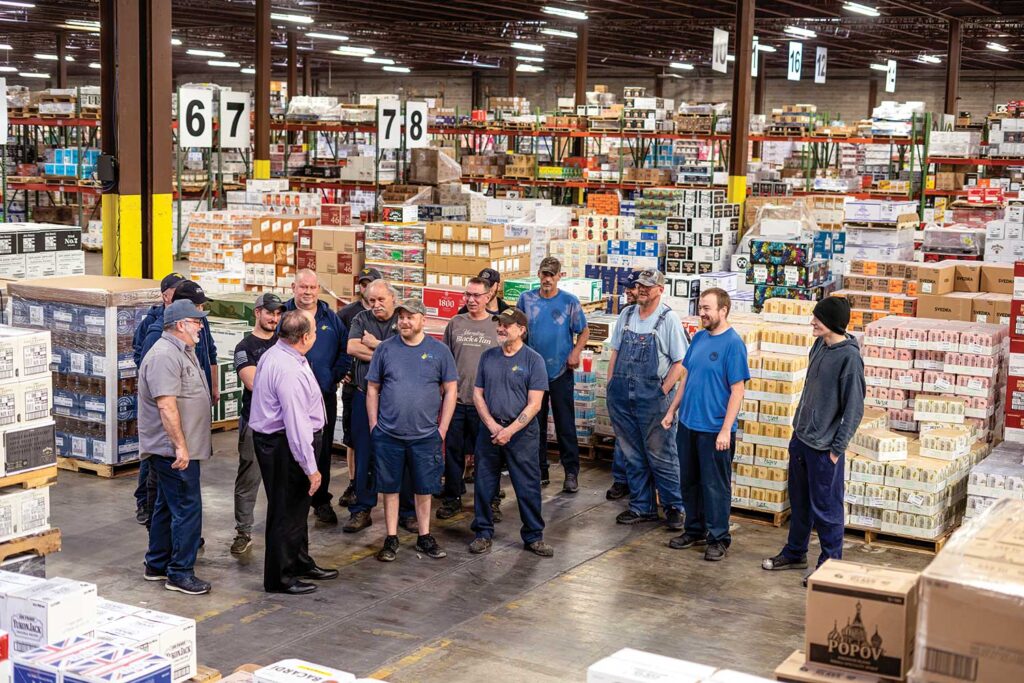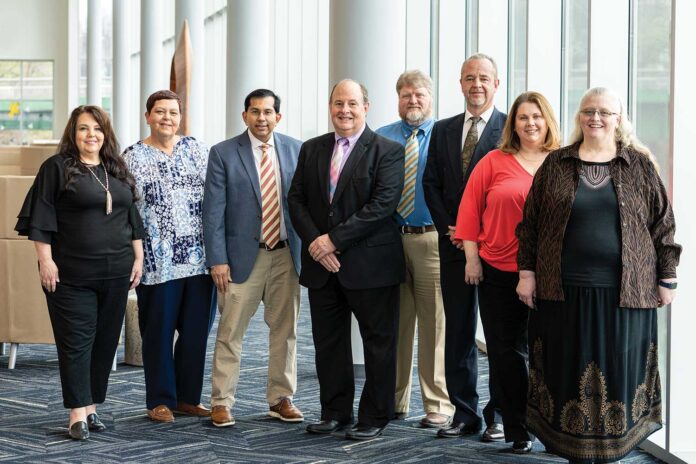Fred Wooton is widely known among colleagues as “The Commissioner of Change.” Currently serving as Commissioner of the West Virginia Alcohol Beverage Control Administration (WVABCA), he has devoted his entire professional career to the beverage alcohol industry, and has a reputation of being a leader who always gets results. In May 2023, Wooton will assume a new leadership role when he becomes Chairman of the National Alcoholic Beverage Control Association (NABCA).
His theme for the upcoming year, “New Horizons, New Opportunities,” illustrates his plans to apply his get-it-done mantra on a national level.
Focus on Modernization and Collaboration
Wooton has been connected to the beverage alcohol industry throughout his career. Early on, he worked in the hospitality industry as a bartender, lounge coordinator and, eventually, as an assistant manager of a Holiday Inn hotel. In 1991, he joined the Charleston-based WVABCA, and held multiple roles within the agency’s Enforcement Division, before Governor Jim Justice appointed him to serve as commissioner in 2017.
“My career has allowed me to experience this industry from a variety of angles, and also helped me understand the different aspects of the WVABCA’s work from the perspective of a server and as a regulator,” Wooton says. “Part of our responsibility as an agency is to look out for the public health and safety of the citizens of West Virginia, but it’s also to help put people in business and to support them along the way.”
A year prior to Wooton’s arrival to the agency, the WVABCA privatized its retail stores, which it now bids out every 10 years in partnership with the state’s Retail Liquor Licensing Board. As part of the rebidding process, the agency also reviews overall sales performance to determine if any areas of the state are currently over- or underserved, and makes licensing adjustments as needed.
Stores can opt to terminate their licenses prior to the 10-year renewal period by selling them to another retailer within the same designated market zone. This sale must be reviewed and approved by the WVABCA. The most recent bid cycle for the state’s 182 licensed retail liquor outlets took place in 2020. It garnered more than $53 million for West Virginia’s general revenue fund — an increase of $15 million over the previous licensing period.
Retail licensing is not the only way the WVABCA’s revenue is growing. Bailment sales in West Virginia have also grown consistently in the last several years, with fiscal year 2022 sales totaling more than $130.6 million — up by 2.03% from the year prior. The number of total case sales between fiscal year 2017 and 2022 increased by more than 186,000 (nearly 200,000 during the same calendar year period). Total annual revenue sales have also increased dramatically, from approximately $93.2 million in fiscal year 2017 to approximately $130.6 million in fiscal year 2022 — an increase of $37.4 million.
Wooton attributes all of these increases to good product management.
In addition to propelling growth, Wooton has focused much of his energy on infrastructure improvements.
After being appointed commissioner, he was tasked with completing a comprehensive warehouse renovation project that had been in process for more than a decade. As part of the effort to modernize the 153,000-square-foot facility located in Putnam County, Wooton led an initiative to install a new security system equipped with state-of-the art camera technology throughout the warehouse.
To replace the warehouse’s former, privately owned water system, Wooton oversaw the removal of an outdated 300,000-gallon water tank, and installation of more than 3,300 feet of new water lines, while also fixing a number of breaks and leaks created by the old system. Wooton is also in the final stages of installing a new fire suspension system that includes the replacement of 1,600 sprinkler heads, a process that should be completed within the next two years.
Looking ahead, Wooton plans to continue these improvement efforts by conducting preventive maintenance on the warehouse’s fork trucks and pallet jacks, modernizing equipment used to transport product the agency’s 2,600 listed products and 2,000 annual special orders throughout the warehouse.
Wooton has also focused on working with the state legislature to enact positive changes to alcohol-related regulations across the state.
In the first major licensing change in West Virginia in more than 50 years, the state’s Class A private club licenses were modified in 2017. This allowed licensees operating resort facilities and other large tourism-related locations to obtain a single private license for alcohol sales and consumption within designated areas across the entire premises — rather than requiring a separate license for different areas of the property.
“This new policy has had a huge positive impact on West Virginia tourism, and it also gives additional opportunities to new businesses,” Wooton explains. Over the years, these changes have resulted in new licenses and new opportunities such as private manufacture clubs at breweries, wineries and distilleries, along with private food trucks, golf courses and sports stadiums.
Additional legislation passed during Wooton’s tenure as commissioner includes a 2019 bill allowing the retail sale of liquor on Sundays, which had previously been prohibited, and has contributed to the WVABCA’s steady revenue growth. The additional day of Sunday sales, and the convenience of being able to purchase liquor on all days of the week, have helped increase the agency’s bottom line.
In 2020, the legislature passed a bill allowing the off-premises sale of liquor in every county and municipality across the state. A number of areas had previously been designated as dry counties, and this new law permitted all municipalities to immediately become wet (although individual municipalities had the right to opt out and remain dry, which only one did).
During the Covid-19 pandemic, temporary legislation was enacted to support on-premise licensees, including third-party delivery, curbside pickup, a streamlined application process for outdoor dining, floor plan extensions and other temporary permits. Many of these provisions later became permanent.
The state has also seen successful growth by its resident brewers and distilleries. Recent legislation to ease the sale of beer and liquor in growlers and allow some exceptions for on-premises consumption has helped brewers and distillers expand.
Along with growth and innovation, much of the WVABCA’s work remains focused on enforcement, education and licensing — specifically on underage drinking prevention initiatives.
Since 2010, the DUI Simulator Program has visited high schools and colleges across the state to educate young people about the dangers of driving under the influence. In 2019, a new simulator was commissioned, featuring state-of-the-art graphics and a moving seat to create a more realistic experience. More than 67,000 students have participated in the DUI Simulator Program to date, which is also offered at county and safety fairs throughout the year.
Another popular prevention initiative is the NO School Spirits public service announcement (PSA) contest.
Now in its tenth year, the program encourages middle and high school students to create videos that emphasize the dangers of drinking and driving. Entrants compete for the top prize of $5,000, and a chance for their video to become a televised and radio PSA that runs during prom and graduation season. Second- and third-place prizes are also awarded. All funds go to the schools to be used primarily for programming related to underage drinking and prevention. Both the DUI Simulator Program and the NO School Spirits PSA contest receive funding from State Farm Insurance, NABCA, and the West Virginia Governor’s Highway Safety Program.
Across all areas of work at the agency, Wooton attributes much of his success during the years to one thing: relationships.
“I still work with some of the same people I did 30-some years ago,” he says. “You get to know people, and you maintain those relationships throughout your career. Staying in contact with people across many different areas of this industry helps me learn about things that are going on, and also gives me great insight into our business from many different angles.”

Expanding to the National Stage
Wooton looks forward to contributing to the work of NABCA in his upcoming role as chairman. As the first West Virginian to hold the position, he will succeed Tim Holden, Chairman of the Pennsylvania Liquor Control Board, who has been in the role since last spring. Having been involved with NABCA for many years, Wooton reflected on seeing many chairmen come and go, and said that he has learned a lot from all of them.
“NABCA is a truly wonderful organization, and I am proud to be a part of it,” he says. “I hope to model my role as chairman after Tim Holden, who has been an outstanding leader and mentor in helping control states continue to modernize and come out stronger after Covid.”
Holden, who said it has been an honor to serve as NABCA Chairman, thinks Wooton is well positioned to take the reins.
“Fred’s qualifications are beyond question,” Holden says. “He has more than 30 years of experience in West Virginia, came up through the ranks, and has so much knowledge across many areas of the business. I am glad to pass the torch to him.”
Wooton also received a strong endorsement from J. Neal Insley, President and CEO of NABCA.
“Fred is a seasoned leader and understands the importance of collaboration and information sharing within our industry,” Insley said. “He has a unique perspective on the issues that our stakeholders face. His enforcement background, coupled with his business acumen, strikes that perfect balance between commerce and public health within the alcohol industry.”
Wooton’s NABCA theme, “New Horizons, New Opportunities,” is timely, as the nation continues moving into the post-Covid era. Despite the many challenges of the past several years, the pandemic has also resulted in a number of positive outcomes that have changed the beverage alcohol industry for the better, from new licensing options to additional consumer trends to innovative modernization opportunities and delivery models.
“Every control state is going through so many of the same things right now,” Wooton says. “At this point in time and always, NABCA allows each of the 18 jurisdictions to learn what works best at other places, discuss the different trends people are seeing, and interact with industry suppliers. Now more than ever, we have an opportunity to learn from one another and help each other move forward.”
Insley agrees, and says that Wooton’s theme exemplifies how NABCA is preparing to move into the future.
“Fred chose this theme because it captures the essence of how change can bring about new opportunities,” Insley says. “We all continue to work in the ever-changing landscape of the alcohol industry since the pandemic. Over the next year, NABCA will work diligently to explore and seek out these new opportunities that have now appeared on our horizon.”
Melissa Sherwin is a freelance writer and marketing communications strategist from Chicago, IL. Her work has appeared in Chicago’s Daily Herald newspaper, Time Out Chicago, Suburban Life newspapers, and various magazines. She is also the author of several children’s books. Follow her @MelissaNSherwin.












